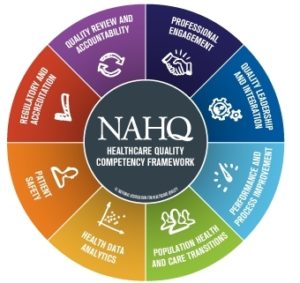HSC and National Association for Healthcare Quality partner to prepare MHA graduates to improve quality outcomes
September 23, 2020 • Uncategorized
 Master of Health Administration students will prepare to achieve Certified Professional in Healthcare Quality® certification during capstone course.
Master of Health Administration students will prepare to achieve Certified Professional in Healthcare Quality® certification during capstone course.
The HSC College of Public Health has collaborated with the National Association for Healthcare Quality (NAHQ) to provide its Master of Health Administration (MHA) students with the opportunity to pursue the only accredited certification in healthcare quality, the Certified Professional in Healthcare Quality® (SPHQ). Students will be provided with test preparation content and tools during the program capstone course, beginning in the Spring 2021 semester. Through this agreement, HSC has become the first MHA program in the nation to hardwire NAHQ’s content into its curriculum.
“Given our MHA program mission to produce graduates who will influence change and improve quality outcomes across the care continuum, HSC is thrilled to collaborate with NAHQ to now offer content rooted in a twice-validated, industry-standard Healthcare Quality Competency Framework,” said Dr. Stephan Davis, Assistant Professor and Director of the MHA program. “As the only Commission on the Accreditation of Healthcare Management Education (CAHME) program exclusively based in North Texas, we utilize a competency-based approach to educating our students and the NAHQ framework supports our model.”
Added Dr. Arthur Mora, CPH Associate Professor and Chair, Department of Health Behavior and Health Systems, “With a reputation for pushing the boundaries of discovery and innovation, HSC takes pride in becoming the first MHA program to align with the gold standard credential in healthcare quality, NAHQ’s CPHQ certification.”
As holders of the CPHQ credential themselves, Drs. Mora and Davis are among the more than 12,000 healthcare and quality professionals who have achieved the designation. They were both instrumental in facilitating this new partnership, according to Stephanie Mercado, CAE CPHQ, NAHQ’s CEO and Executive Director.
“I wholeheartedly commend Drs. Mora and Davis for creating a pathway for their students to graduate with not only a premier, CAHME-accredited graduate degree but with an industry-recognized credential,” Mercado said. “We see a growing imperative to focus on workforce readiness to delivery on quality, safety and value. NAHQ applauds HSC’s leadership and encourages other health administration academic programs to consider this alignment so we can continue the journey toward consistency in this critical area of healthcare management.”
Dr. Anthony Stanowski, president and CEO of CAHME, added, “HSC’s design of its curriculum provides high value to students who seek to make a difference in healthcare. By linking NAHQ’s certification credential to successful graduates of the CAHME-accredited HSC MHA program, students can present to potential employers that they graduated from an accredited program with the skills and CPHQ credential to improve healthcare quality and safety.”
“I’m excited for HSC’s current and future MHA students,” said Dr. Dan Gentry, president and CEO of the Association of University Programs in Health Administration (AUPHA). “When AUPHA advocated for, and CAHME acted on, moving from curriculum content areas to competencies at the turn of the century, these kinds of opportunities were exactly what we had in mind. Personally, I’ve always advised my own graduate students that getting specialized training, in areas such as quality improvement and Lean Six Sigma, project management and financial management, will set them apart and serve them and their future employers well.”
NAHQ is the leader in healthcare quality workforce competencies and creator of the twice-validated, industry-standard Healthcare Quality Competency Framework. NAHQ provides a strategic advantage to healthcare professionals and the organizations they serve by developing and evolving workforce competencies in healthcare quality that result in better patient and financial outcomes to support the goals of healthcare value.


Social media